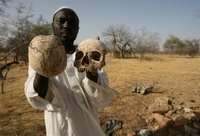Darfur town burnt to ground under control of Sudanese troops
A Darfur town is now under the control of Sudanese troops. Observers who inspected the town of Haskanita say 15,000 civilians have fled since the army moved in.

The North Darfur town of Haskanita, "which is currently under the control of the government, was completely burned down, except for a few buildings," the U.N. mission to Sudan said in a statement.
The U.N. said Sudanese government forces took control of the area after suspected Darfur rebels attacked the nearby AU base a week ago, killing 10 peacekeepers.
The U.N. insisted it wasn't making accusations on who burned down Haskanita. "The UN has no mandate to investigate security incidents," the U.N. spokeswoman in Sudan, Radhia Achouri, said in an e-mail to the AP, adding that it would be up to the AU to find out what happened.
For its part, the AU confirmed it was investigating the attack on the base, but could not say whether it would enlarge its inquiry to the nearby destroyed town.
AU investigations are carried out through a body known as the Cease-Fire Commission, which includes representatives of the Sudanese army and some rebels. They have to approve findings before they are made public.
A U.N. official who just came back from Haskanita, however, said there was a full army battalion, or 800 men, now stationed at the entrance of the town, which he described as "still smoldering."
"There's absolutely no doubt the army and janjaweed did it," the official said, requesting anonymity because the Sudanese government regularly expels observers who speak out. He said the town was now empty.
The Arab-dominated government and its allied janjaweed militias of nomad Arabs are accused of regularly burning ethnic African villages as part of their counterinsurgency campaign against local rebels.
Sudan's government denies backing the janjaweed, who are accused of the worst atrocities in four years of conflict that has killed 200,000 people and chased 2.5 million from their homes, largely ethnic Africans.
An AP reporter saw Haskanita intact last Sunday when the army was moving in. But plumes of smoke could already be seen rising from several nearby villages while flying over the area.
Multiple calls to the office of the Sudanese military spokesman were unanswered Sunday.
The U.N. statement said the market area had been looted and that some residents had returned to search for food and water.
International aid workers, several local rebel chiefs and U.N. officials who had just returned from Haskanita said the town of about 15,000 had emptied last Sunday and Monday because of the suspected rebel attack on the nearby AU base. Government troops looted the town Tuesday, they said, and began burning it down on Wednesday.
The international aid workers and U.N. officials dismissed claims by some rebel chiefs that there were civilian casualties in Haskanita.
Gen. Martin Agwai, the commander of the underfunded and ill-equipped AU force of 7,000 currently in Darfur, vowed at the funeral of the slain peacekeepers this week he would rebuild Haskanita's base and resend troops there soon. Agwai is also to head a joint mission of 26,000 U.N. and AU peacekeepers due to takeover on Jan. 1st.
Large quantities of ammunition and several vehicles were looted from the base when rebels raided it, killing 10 and injuring 14 peacekeepers in an attack that threw into peril new peace talks between the Sudanese government and Darfur's many rebel factions.
George Ola-Davies, the spokesman for the joint U.N.-AU mediation team, told AP on Sunday the venue of the talks had been changed from the capital of Tripoli to Sirte, the town where Libyan leader Moammar Gadhafi usually resides.
The attack on the AU's Haskanita base and the razing of the town won't delay the opening of negotiations, the spokesman said.
"That is in fact a resolve for the people of Darfur to come forward and negotiate peace," he said on the telephone from the AU headquarters in Ethiopia.
A key Darfur rebel chief, Abdul Wahid Elnur, has refused to attend talks as long as they are held in Libya. The second key leader, Khalil Ibrahim of the Justice and Equality Movement, initially accepted but is now threatening to boycott. He says the U.N. must clarify which of the rival Sudan Liberation Army splintered rebel factions are invited to the talks.
Ola-Davies conceded that the U.N. and AU mediation has "so far not gotten any clear indication of who will be representing who."
Darfur rebel groups trade accusations on who attacked the AU base. Peacekeepers told the AP in Haskanita last Sunday as they recovered from the attack that they had identified the assailants as belonging to a subgroup called SLA-Unity, which has been invited to the peace talks.
Mohammed Osman, a local chief of SLA-Unity, insisted his group didn't do it. "The attackers were all from JEM," Osman said by satellite phone from a location he described as the front line of the rebel positions near Haskanita.
Ibrahim, however, categorically denied JEM had attacked the base. "I swear on the Quran neitherI nor any of my men took part," Ibrahim said, referring to Islam's holy book.
A U.N. official in Darfur said he was convinced JEM had lead the attack, and that SLA-Unity had come in the base later to share in the looting.
The official said rebels had given a 48-hour notice they would attack the base because it hosted members of the Sudanese military, whom rebels accused of directing the numerous government aerial bombings that have taken place around Haskanita for the past month.
Subscribe to Pravda.Ru Telegram channel, Facebook, RSS!




